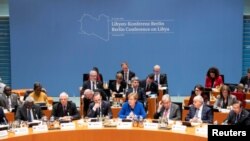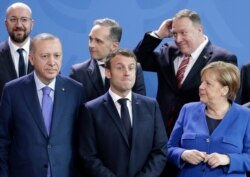EU foreign policy chief Josep Borrell said Monday someone will need to act as a monitor in order for a cease-fire in Libya to work.
He spoke to reporters ahead of a meeting where EU foreign affairs ministers were to talk about the situation in Libya and an agreement reached Sunday by a group of world leaders to respect an arms embargo and back off from interfering in Libya.
"You cannot say, 'This is a cease-fire,' and then forget about it," Borrell said. "You want to keep the cease-fire alive, someone has to monitor it. United Nations, African Union, European Union, someone has to do it."
Twelve world leaders along with top representatives from the EU, U.N., African Union, and Arab League, used a one-day summit in Berlin to reach their agreement on Libya, where forces from two rival governments are fighting for power.
"We were able to see that everyone is in agreement that the weapons embargo needs to be respected and the weapons embargo needs to be more strictly controlled that has happened in the past," German Chancellor Angela Merkel, the summit host, said at the conclusion. "It has, I think, become evident in the last days that there is no chance for a military solution, which could only increase the suffering of the people."
Participants agreed that the week-old truce in Libya needs to become a more durable cease-fire. U.N. Secretary-General Antonio Guterres said all sides need to put pressure on the warring parties in Libya. With different countries backing different sides in Libya, there has been growing concern that Libya will become another Syria.
"Until now, we had the escalation of the Libyan conflict with some foreign interference," Guterres said. "That escalation ... was becoming extremely dangerous."
While participants agreed Sunday not to boost their military support for the rivals, it is unclear if and when they will withdraw their current support. Merkel said "that is a question for the real cease-fire."
U.S. Secretary of State Mike Pompeo urged the Libyan sides to seize the opportunity to use U.N.-led mediation and "decide on a future for themselves" that is free from violence fueled by outside parties.
Pompeo said there are still questions about how effectively the arms embargo can be monitored, but expressed optimism about lower levels of violence in Libya.
"I think we made progress, at least progress in getting fewer new weapons systems, fewer new forces to flow into the region, so that we can get at least a standstill so that we can begin to unwind this potential tragedy and get to the political resolution that I know everybody that came there today wanted to achieve," Pompeo told reporters.
Two rival governments in Libya are battling for power — one in the east headed by former Gen. Khalifa Haftar and a U.N.-backed administration in Tripoli led by Prime Minster Fayez al-Sarraj. Both were in Berlin Sunday, but were not at the conference table.
Haftar’s forces captured the key Mediterranean coast city of Sirte two weeks ago. But the fight for the capital, Tripoli, has generally been stalled since April with hundreds of thousands of civilians caught in the middle.
Meanwhile, Libya's National Oil Corp. reported Sunday two major oil fields were going offline after Haftar's forces shut down a pipeline — two days after Haftar's forces blockaded two Eastern ports from which oil is exported.
Libya’s economy is depended on oil and Guterres says he is "very worried."
Libya has been in political and social turmoil since 2011 when longtime dictator Moammar Gadhafi was toppled and killed. Numerous armed factions have been jockeying for power since then with the U.N. unsuccessfully trying to put together a stable central government.






